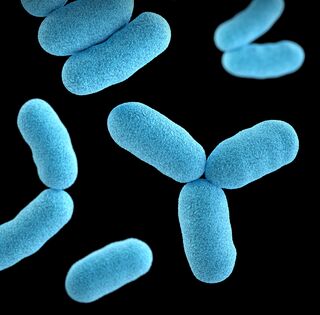Emotion Regulation
The Microbiome and Its Potential Link to Emotions and Behavior
Gut bacteria and infant temperament.
Posted July 5, 2021 Reviewed by Lybi Ma
Key points
- The study found that bacteria in the baby gut microbiome were associated with better emotional regulation at 6 months of age.
- This study found that a less diverse microbiome was associated with greater expression of negative emotions and emotional reactivity.
- Such findings open up another avenue of research in the gut microbiome-brain axis.

In recent times, there has been ever-growing interest in investigating the link between the microbiota in the gut and the brain, particularly with respect to mental processes and mental health. Perturbations to the composition of bacteria in the gut have been implicated in a number of neurological and mental disorders, such as depression and anxiety. Conversely, probiotic supplementation has been found to reduce anxiety-like and depression-like behaviors (Vuong et al., 2017). Additionally, transferring microbiota from mice with high anxiety to those with low anxiety induced an anxiogenic effect in the latter (Collins, Kassam, & Bercik, 2013). As it turns out, even temperament, defined as the variation in emotional self-regulation and activity, is closely related to the microbiome. Recent findings by Aatsinki et al. (2019) suggest that the gut microbiota in infants at 2½ months of age is associated with subsequent trends in temperament in these infants at 6 months of age.
Prior literature indicated that microbes in the gut serve as a means of bidirectional interaction between the gut and the central nervous system (CNS) through the vagal nerve, and can regulate behavior via modulating the expression of receptors for the neurotransmitter GABA. This has been implicated in the regulation of emotion and behavior (Bravo et al., 2011). Aatskini’s team sought to see how this manifested in a cohort of actual infants over time.
What the authors did was to obtain fecal samples from the 2½-month-old infants, which were then subject to genomic sequencing to elucidate which microbes were found in each infant’s stool sample. The temperament of each infant was evaluated via administering the Infant Behavior Questionnaire Revised Short Form (IBQ-R SF) at 6 months. In the questionnaire, mothers were requested to gauge their babies’ recent behavior within the parameters of positive emotions (e.g. approachability), negative emotions (such as fear and anger), and emotional regulation.
What the study found was that infants whose feces (and hence, gut microbiota) consisted of the bacteria Bifidobacterium and Enterobacteriaceae were found to exhibit better emotional regulation at 6 months of age. Furthermore, infants whose gut microbiota was composed of higher levels of the bacteria Bifidobacterium and Streptococcus wound up exhibiting more positive emotionality. Just as importantly, infants whose microbiota was less diverse, or consisted of fewer bacterial species, exhibited greater reactivity and expression of fear and negative emotions.
In light of such a significant association between gut flora and mental health, especially at such an early age, one can see how determining one’s gut microbiota could potentially play a key role in the early detection and resolution of potential mental health problems in the future. This is particularly pertinent with respect to temperament. A negative emotional temperament is strongly associated with more marked behavioral difficulties during early to late childhood. This, in turn, is highly likely to lead to a “domino effect” and compromise psychological development during adolescence and adulthood (Abulizi et al., 2017).
With that being said, we must remember that there is a combination of “nature” and “nurture” with regard to mental health. One may have the biological predisposition to acquire a negative temperament, but if spotted early, then we can respond accordingly to ensure that the environment can facilitate an ideal and effective emotional and psychological development.
How can we respond to alter the gut microbiota for the better? Well, one intuitive way is through alterations in diet. The concept of probiotics such as yogurt and other fermented foods such as water kefir and sauerkraut is quite well known. High fiber foods are also associated with better facilitating a conducive environment for “good” bacteria such as Bifidobacterium and Lactobacillus. Conversely, high-fat diets are associated with reductions in such bacteria (Singh et al., 2017). Furthermore, there is the possibility, in extenuating circumstances, that fecal microbiota transplants can be conducted for those who truly need it.
Of course, we will need much more further investigation to substantiate both the validity of the link between gut bacteria and temperament, as well as to determine many more species of bacteria that may either predispose an individual to a better or worse temperament. The growing notion of gut bacteria being a key correlate to good neurological and psychological function is an exciting one. The notion of intervention for gut microbiota modification opens up a whole new avenue that is worth pursuing further.
References
Aatsinki, A.-K., Lahti, L., Uusitupa, H.-M., Munukka, E., Keskitalo, A., Nolvi, S., … Karlsson, L. (2019). Gut microbiota composition is associated with temperament traits in infants. Brain, Behavior, and Immunity. https://doi.org/10.1016/j.bbi.2019.05.035
Abulizi, X., Pryor, L., Michel, G., Melchior, M., van der Waerden, J., & EDEN Mother–Child Cohort Study Group (2017). Temperament in infancy and behavioral and emotional problems at age 5.5: The EDEN mother-child cohort. PloS one, 12(2), e0171971. doi:10.1371/journal.pone.0171971
Bravo, J. A., Forsythe, P., Chew, M. V., Escaravage, E., Savignac, H. M., Dinan, T. G., . . . Cryan, J. F. (2011). Ingestion of Lactobacillus strain regulates emotional behavior and central GABA receptor expression in a mouse via the vagus nerve. Proceedings of the National Academy of Sciences, 108(38), 16050-16055. doi:10.1073/pnas.1102999108
Collins, S. M., Kassam, Z., and Bercik, P. (2013). The adoptive transfer of behavioral phenotype via the intestinal microbiota: experimental evidence and clinical implications. Curr. Opin. Microbiol. 16, 240–245. doi: 10.1016/j.mib.2013.06.004
Singh, R. K., Chang, H. W., Yan, D., Lee, K. M., Ucmak, D., Wong, K., … Liao, W. (2017). Influence of diet on the gut microbiome and implications for human health. Journal of translational medicine, 15(1), 73. doi:10.1186/s12967-017-1175-y
Vuong, H. E., Yano, J. M., Fung, T. C., and Hsiao, E. Y. (2017). The microbiome and host behavior. Ann. Rev. Neurosci. 40, 21–49. doi: 10.1146/annurev-neuro-072116-031347


